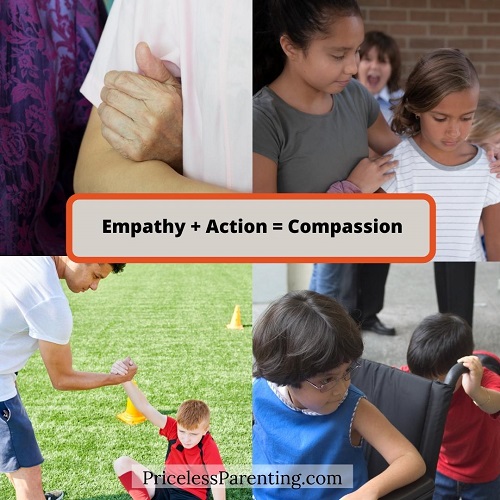Raising Compassionate Kids Who Are a Force For Good
by Kathy Slattengren, M. Ed., Priceless Parenting (sign up for monthly parenting newsletter and receive 20+ printable charts for kids and parents)

How can you encourage kids to act with more compassion? Before your children can act compassionately, they need to be able to
feel empathy for others.
Without empathy there is no compassion. Children must first notice that someone is suffering before they can act in a helpful way.
Dr. Theresa Wiseman identified four attributes of empathy:
- to be able to see the world as others see it
- without judgment
- recognize their emotions
- communicate your understanding of what they are feeling
When your children feel empathy, they can imagine what it must be like for that other person. Children often want to do something to help. Compassion requires acting on empathic feelings and doing something to lessen the other person’s suffering.
Feeling empathy without taking action to help can lead to feelings of distress. In Daniel Goleman’s book,
A Force For Good: The Dalai Lama’s Vision for Our World, he explains, “When we simply empathize, tuning in to someone else’s suffering – for example, seeing vivid photos of burn victims and other people in grave distress – the brain fires the circuitry for feeling pain and anguish. Such empathic resonance can flood us with emotional upset – ‘empathy distress’, as science calls it. Professionals like nursing are too often plagued by such chronic anxiety, which can build to emotional exhaustion, a precursor to burnout.”
Goleman continues “Compassion, the findings suggest, serves as an inoculation against empathy distress, with more activity in the brain centers for caring, which builds resiliency instead of burnout.” Guiding your children to turning their empathy into action helps both them and others.
Showing Empathy Versus Showing Compassion
Compassion involves putting your time, energy and resources where your heart is. Compassion requires the courage to act when it’s easier not to.
For example, if your child sees another child sitting alone at lunch and feels bad for that child that's empathy. If your child chooses to sit down with that student for lunch that's showing compassion.
If your child sees somebody being bullied and feels bad for them that's empathy. If your child see somebody being bullied and stands next to him or her to provide support that's compassion.
Children have a great capacity for empathy and compassion. They may need your help in implementing their ideas. For example, some children in our area heard about the wildfires that had burned a number of homes in Eastern Washington. They decided to have a bake sale to raise money to help the people who lost their homes. Their parents helped them organize it and donate the money.
Guiding Children Towards Compassion
Being able to put themselves in someone else’s shoes is a skill that develops as children mature. Sometimes kids benefit from having someone else help them see things from another’s perspective.
In his book
The Boy Who Was Raised as a Dog, Dr. Bruce Perry describes Peter, a first grade boy whose parents adopted him from Russia. Peter spent his first three years of his life in an orphanage primarily stuck in a crib. His parents were seeking help from Dr. Perry due to a number of Peter’s behavioral issues. Because he didn't get the loving interactions he needed early on, his social skills were far behind other children his age.
Dr. Perry realized that Peter's peers were in the best position to help him learn these social skills so he spoke to Peter's first grade class. He explained why Peter's brain was different than theirs and how they could help Peter. Afterwards he writes "The brightest and strongest children in his class took a special interest in him and their leadership made all the difference. They included him, protected him and, ultimately, provided therapeutic experiences that helped Peter catch up. They were tolerant of his developmental problems, patient in correcting his social mistakes and nurturing in their interactions."
Before Dr. Perry’s visit, the children avoided Peter. After Dr. Perry helped Peter’s classmates replace fear of Peter with empathy, the children acted with compassion.
You can encourage compassion in your kids by asking questions like “What did you do today to help someone?” When you ask about something every day, your kids get the message that this is important to you. Your positive attention to your children’s stories will reinforce their kind behavior.
Benefitting from Compassion
When children show compassion, they also benefit. In the book
A Force For Good, Goleman reports “In research at the University of North Carolina, practicing an attitude of loving-kindness not only lessened depression and boosted positive moods but also increased sense of satisfaction with their lives, strengthening their connection with family and friends. … Early findings on cultivating an attitude of compassion suggest even biological benefits, such as lessened inflammation and lowered levels of stress hormones.”
The scientific research supports these words from the Dalai Lama. “The human capacity to care for others isn’t something trivial or something to be taken for granted. Rather, it is something we should cherish. Compassion is a marvel of human nature, a precious inner resource, and the foundation of our well-being and the harmony of our societies. If we seek happiness for ourselves, we should practice compassion: and if we seek happiness for others, we should also practice compassion.”
What ideas do your kids have for living more compassionately? When they act in ways that are motivated by genuine concern for others they are a force for good!